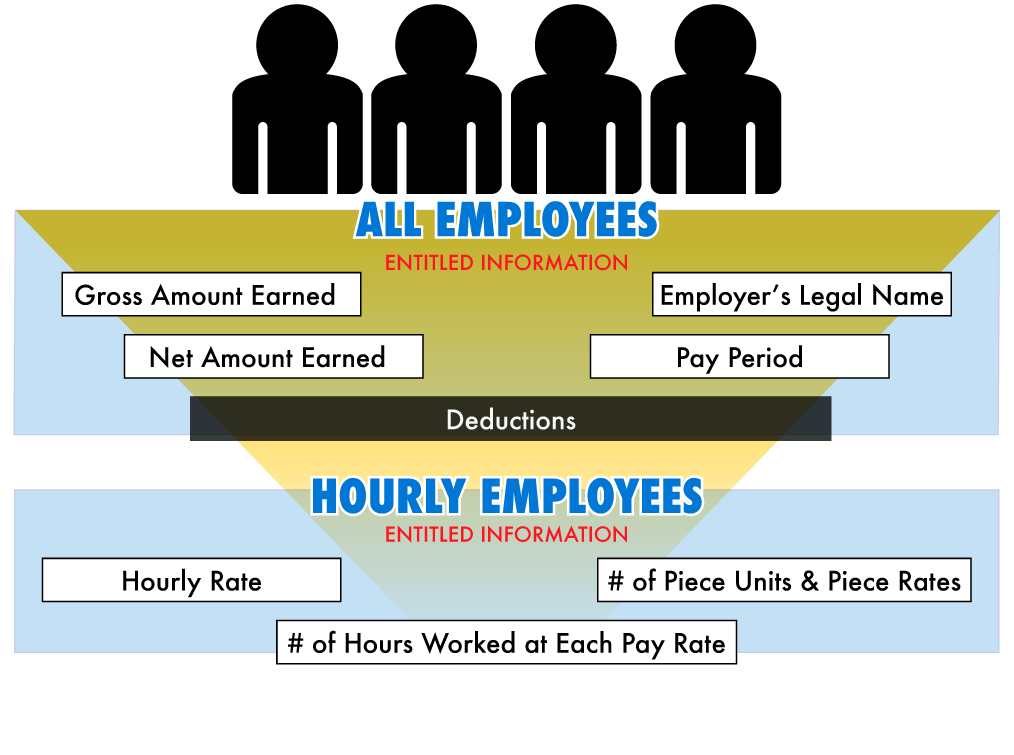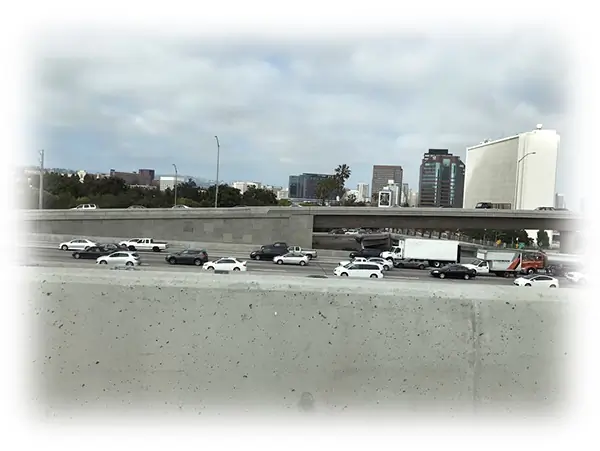Pay Stub Errors
LABOR CLASS ACTION LAWYER
Employers who fail to provide proper itemized paystubs owe employees an initial $50 penalty and $100 penalty thereafter up to $4,000. Some of the paystub information employers must provide to hourly workers differs from the information they must provide to salaried workers. This article details some of the differences.
All California employees must be provided a detachable part of a check, or a separate itemization showing the gross and net wages earned. All California employees must be told in writing what amount of money goes towards deductions. Exempt and nonexempt workers must be told what calendar days (period) their paycheck corresponds to. The legal name of the employer must be on the paystub.
The itemization on California employee paystubs must explain to hourly employees how many hours they are paid for, and at what rate of pay. If an hourly employee is paid a piece rate the number of piece rates and all applicable piece rates must be itemized.
WAGE THEFT EXAMPLES
The Employment Lawyers Group succeeded in several class actions for paystub violations with the following fact patterns:
- Paystubs failed to list hours spent waiting for on-call, calls as hours worked
- Hours worked lumped overtime hours into straight pay hours
- Employees deprived of meal and rest breaks did not have an hour showing on their paystubs for missed meal and rest breaks
- The paystub listed the name of an entity the employer claimed was not the employer, but was a holding or parent company
- Off-the-clock work did not appear on the itemizations
- The number of hours worked, as stated, on the paystubs was wrong because the time clock failed to record all hours worked, or the employer changed the time punches
- A rate of pay was listed on the paystub that was not the correct rate of pay
- Multiple rates of pay paid to employees were not listed
- Pay was diverted into fringe benefits on a prevailing wage job and it was impossible to determine how many hours 401k contributions represented, and the full prevailing wage rate was not listed on the paystub

Case law held meal break violations can lead to California Labor Code Section 226 violations. Perez v. Safety, 253 F.R.D. 508, 517 (N.D. Cal. 2008) precluded summary adjudication on Labor Code Section 226 claims based upon meal break violations when employees presented evidence they worked 100 hours a pay period due to not being relieved from meal breaks whereas the paystubs claimed they worked 80 hours per pay period.

EMPLOYEE CLASS ACTION
A class action lawsuit is the best remedy for paystub errors. Because there is a maximum $4,000 fine, if the employee has not suffered actual damages which are more for the error, paystub lawsuits are most economically handled as class actions. The employee who acts as the class representative is likely to receive a court approved, “Service Award” in addition to their damages.
Bell v. Farmers, 115 Cal.App.4th 715, 726 (2004) upheld service awards to give named plaintiffs compensation for their efforts in bringing the case. A number of federal decisions have allowed service awards to named plaintiffs who are not class representatives. Trujillo v. City of Ontario, 2009 WL 263723 (C.D. 2009) awarded service awards of $10,000 to ten of the twelve named plaintiffs. Service awards to two named plaintiffs were justified where they constituted a small percentage of the gross settlement, In Re Mego Fin, 213 F.3d 463. Ingram, 200 F.R.D. 685, 694 (N.D. Georgia 2001) held service awards of $3,000 to non-representative class members who actively participated in the litigation were warranted. Byran v. Pittsburg, 59 F.R.D. 616. 618 (W.D. PA. 1973) awarded the most active members of the plaintiff class service awards. Huguley v. General Motors, 128 F.R.D. 81, 85 (E.D. Mich. 1989) reversed on other grounds at 35 F.3d 1052 (6th Cir. 1994) awarded incentive payments to 88 class members, including named plaintiffs as well as potential and anecdotal witnesses. Roberts v. Texaco, 979 F.Supp. 201-202 (S.D.N.Y. 1997), in general, wrote plaintiffs in employment class actions who are present or former employees put their credentials and recommendations at risk is suing the employer so service awards are justified. In Boyd v. Bank of America SA-13-CV-00561 DOC on January 19, 2016 Hon. David Carter awarded $2,000 to each class member deponent for their time and effort in providing deposition testimony in support of the class and $1,000 to each class member who provided document and interrogatory discovery responses
Typically paystub errors happen in mass. The same legal violation happening in mass is what class action lawsuits are designed for. Paystub violation lawsuits are more cut and dry than other labor and employment cases. The cut and dry nature of these mass wage violations to a number of employees is another reason why they are particularly well suited for class action treatment. A number of our class action clients have come to our firm on the basis their paystub did not make any sense. Many of these clients suspected they were unpaid. Often, we find additional Labor Code violations. Employers who are not particularly concerned with complying with California paystub rules often are violators of other labor laws. Employers who lose paystub violation lawsuits must pay the legal fees and costs of the winning employee. If you were the victim of a paystub error it is best to discuss the situation with an experienced labor attorney. It does not cost you anything, and you may well deserve compensation a labor lawyer in this field is best able to get for you.



